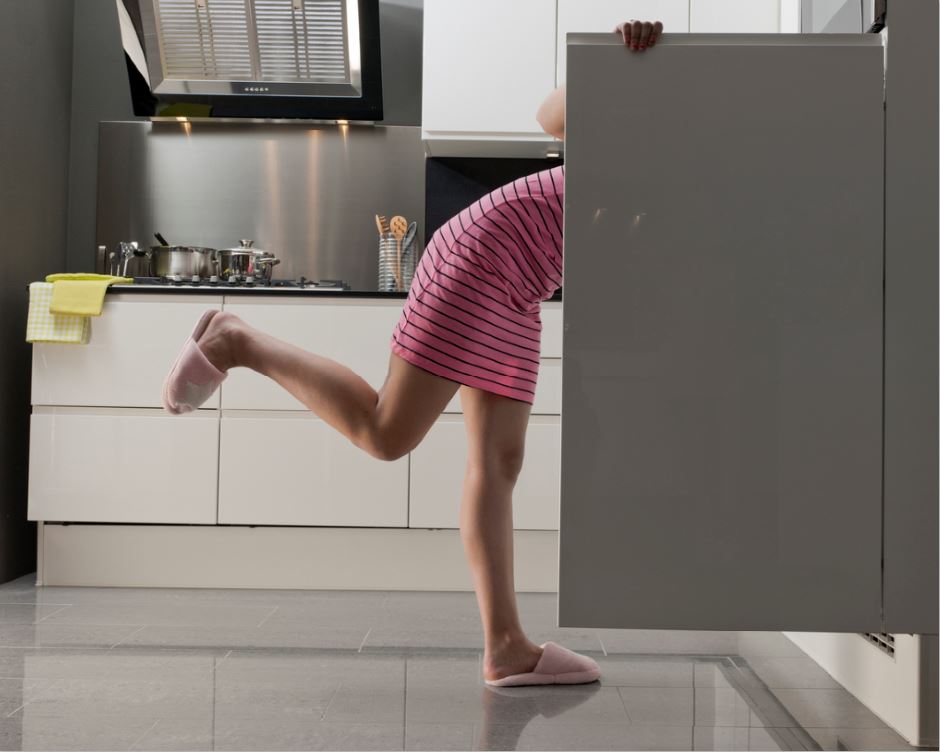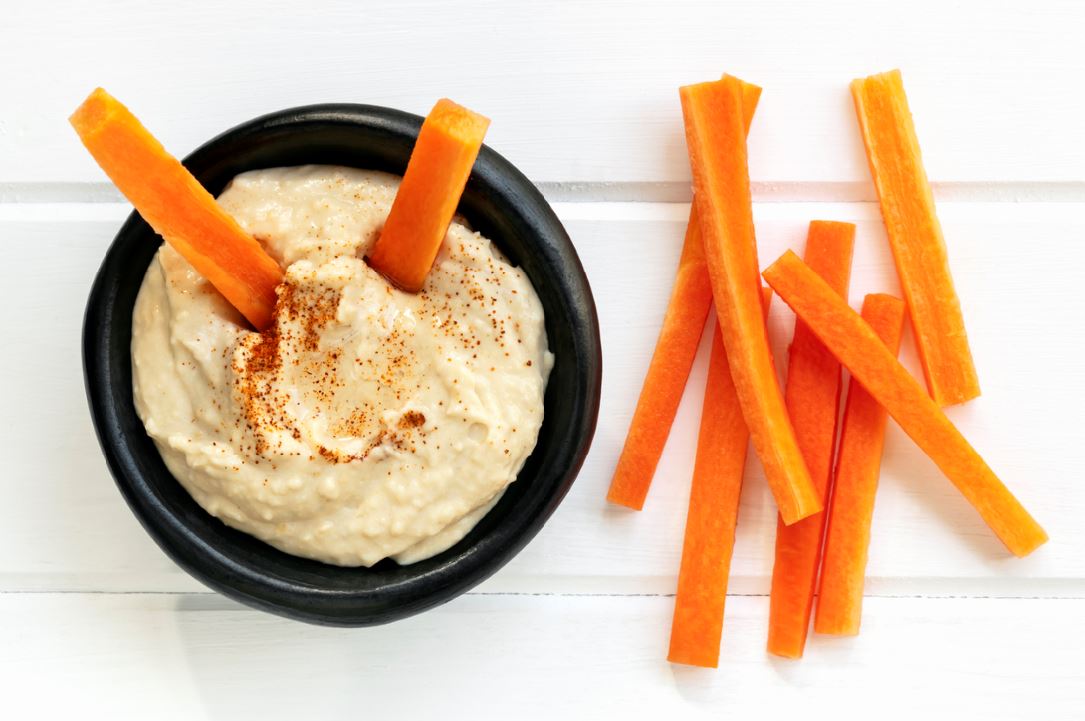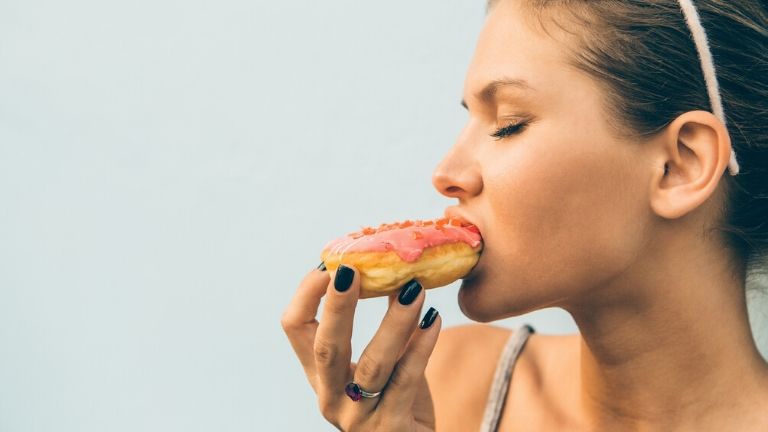Can’t stop snacking? With a second lockdown looming, it’s time we tackled our bad habits – before it’s too late. Behaviour change specialist Dr Heather McKee reveals 7 tips on how to stop snacking
What’s the first thing that comes to mind when you hear the word ‘lockdown’?
Because all we hear is ‘blissful, uninterrupted snack time’, (as well as ‘OMG we’re living through a worldwide pandemic’).
Seriously though, who else found themselves making multiple trips to the fridge or snack cupboard over the lockdown period?
Indeed, recent research by OnePoll, found that almost one in three (28 per cent) people have been found to be consuming more unhealthy snacks and drinks since the beginning of lockdown.

Although there is nothing quite as relaxing as binge watching a Netflix series surrounded by your favourite snacks, if done too often, you may start to notice some unwanted weight gain.
Not only that but when given the opportunity to frequently snack, this can soon become an unhealthy habit leading to a dip in energy levels, low mood, anxiety or depression.
when given the opportunity to frequently snack, this can soon become an unhealthy habit
With a second lockdown looming after a sharp rise in coronavirus cases, Prime Minister Boris Johnson announced tougher restrictions including office workers being asked to return to working from home.
Read More: Working from home? Increase your productivity with these 5 tips
We can’t help but think that for many of us, this can only mean one thing – more snacking.
That’s why Healthista caught up with Healthista Collective Expert and Behaviour Change Specialist Heather McKee, who has some advice on how to stop snacking:
Why we snack…
Snacking is a habit area I have always been passionate about, and since lockdown, bad snacking habits are more prevalent than ever before.
Habits are formed through context-dependent repetition. This means that when you do something enough times and in the same circumstance, it will become a habit – a repetitive behaviour.
Every habit provides a reward, and where snacking is concerned, it’s a reward beyond just the tastiness of food. It’s a reward that allows you to be distracted from your thoughts and allows you to break from your work.
when you do something enough times and in the same circumstance, it will become a habit
When trying to end any habit, you need to look at the habit as if you were untying a knot. Habits are a complex mesh of behaviors and you can’t resolve them easily or all at once.
Like with a knot, you can’t just start pulling at the middle, because it’s only going to get tougher. Instead you need to work on untangling the knot one thread at a time until the knot is unraveled.
Therefore, in order to start tackling a bad habit you need to find out what cue is causing the bad habit in the first place and we have two possible cues (temptations) – environmental and emotional.

Environmental cues
When looking at environmental cues, specifically in relation to snacking, this can be anything from how close a snack is to you (eg: on your desk) or physically being somewhere that you associate with food or snacks (eg: sat at your kitchen table).
During lockdown, our home and work environments merged – I believe this is one of the main reasons for increased snacking.
many people are working from their kitchens, a place often associated with food
Your home environment is a place where you are in a relaxed state, where you treat yourself to a snack or two, before returning to a more controlled and less relaxed work environment – where there are ultimately less opportunities for snacking.
Now though, people are spending their entire day in their relaxed environment (at home), hence the urge to snack more frequently. Plus, a lot of us aren’t used to being that close to a fridge or cupboard full of snacks.
Even sitting at your kitchen table when working from home will cue you into thinking you should be eating or snacking, which will cause feelings of hunger.
Emotional cues
When it comes to an emotional cue, snacking is usually a symptom of something greater, just like excessive drinking is often a symptom of something greater.
Abusing food and alcohol is often used as a way to manage emotions – hence the term emotional eating, which most people can relate to. Do you ever find yourself snacking more frequently when you are stressed, anxious, tired or fed up?

With everything going on in the world right now, stress and anxiety is at an all time high.
People are tired, stressed, worried about their jobs, trying to manage kids as well as trying to work from home. That’s a lot of emotions to deal with.
Driven by emotions that the current environment has aggravated or triggered within us, people are more likely to reach for snacks and food as it offers a momentary distraction and acts as a coping mechanism.
When looking back to the lockdown period in particular, it seems clear to me that snacking habits were born due to an environmental cue, but were made worse due to heightened emotions (emotional cues).
You’re brain has therefore associated being anxious and worried with going to the fridge to fill that emotional void, and because you’re at home, access to the fridge is easier than ever.
Ask yourself why you think you are snacking…
Ask yourself why you think you’re snacking – it’s an important question to ask. We’re always so focused on finding a solution rather than focusing on why and when the habit started in the first place.
Your snacking may just come down to the fact that someone has put a lovely cake near your table (environmental), but most of the time snacking habits have evolved through a coping mechanism (emotional).
If you want to change your habit in the long term you have to understand what’s driving it.
After asking yourself why you think you are snacking, you can work on untying that habit knot with these 7 tips on how to stop snacking…
7 ways we can stop snacking
#1 Out of sight, out of mind
Have you ever seen a Mars bar in a shop and all of a sudden wanted one? You probably wouldn’t have even thought about it until you saw it.
When working from home try not to have any food out on display and make sure unhealthy snacks are not the first thing you see when you open the fridge or cupboard.

Studies have shown that when putting a bowl of M&Ms on a secretary’s desk versus six feet away, the secretaries who had the bowl on their desk gained six to seven pounds a year compared to the secretaries who were six feet away.
This is due to the fact that being away from the desk meant a conscious decision was made to head over to the bowl of M&Ms rather than mindlessly reaching into the bowl. Therefore, creating that space (six feet) between themselves and the snack made it less likely they would engage in that habit.
Are the wine glasses and wine easy to reach? Are your snacks all in one easy to get to place? Bowls of sweets on the table? My advice is to make snacking hard for yourself, hide the snacks where you wont see them.
Are your snacks all in one easy to get to place? Bowls of sweets on the table?
Or if you really can’t trust yourself get rid of the snacks altogether. If you reach that 4pm slump and realise you have to leave the house and walk to the shops to get yourself a snack, you’re more likely to just let that craving go.
Not only that but as I mentioned above, many people are working from their kitchens, a place associated with food, with the fridge in plain sight.
It’s similar to if you were to lie down on your bed, you would be cued into wanting to sleep or if you were to go into a bathroom you could be cued into wanting to go to toilet.
If you can work from any other room, then do so, or sit with your back to the fridge. Try and change your scenery throughout the day by changing rooms if that’s an option for you.
#2 Replace unhealthy snacks with healthy ones
Make it easy on yourself by placing easy to eat (healthy) snacks where you can see them. Have a bowl of fruit out and carrot sticks ready cut in the fridge. That way you can avoid the emotional turmoil of ‘what can I snack on?’
Remove the cake and replace it with yogurt. If you’re reaching for crisps try carrot sticks instead. Wine cravings? Swap for a flavoured sparkling water.
Creating an environment that is a healthier will help you make better choices
As humans we are designed to be lazy and conserve our energy, so if we can make it easier to eat well and have a healthy snack at the ready, it’s far more likely that we will decide to eat that rather than going down the road for a chocolate bar.
Creating an environment that is a healthier will help you make better choices. It’s not about depriving yourself, or having a cookie jar that you need to climb a ladder to get to (although that is a good idea), it’s simply about making it easier for yourself to successfully snack healthier (or to not snack at all).

#3 Schedule your snack times
Do you notice that there are certain times of day where you want a snack more than others?
If that sounds like you, start writing down when these snack cravings and urges occur. Record where you are, what you are doing, what time it is and what sort of mood you are in.
What is it about that time of day that makes you more susceptible to snack? Is it tiredness, is it stress or anxiety? What reward are you looking for? Be aware of the situation that usually causes you to give into a snacking temptation.
start writing down when these snack cravings and urges occur
When you have figured out why you are likely to snack and when, you can schedule a specific ‘snack time’.
Make it a ritual, create an occasion and rationale around it. It’s a concept in psychology known as delayed gratification. Eat it in a mindful way so that you can truly appreciate and enjoy the pleasurable snack experience.
That way you won’t be going on a random hunt for a snack but actually looking forward to a specific time you can sit down and enjoy every second of that well-deserved treat you’ve been thinking about.
#4 Find another distraction that isn’t food related
There’s an interesting concept in psychology called urge surfing. This process is your reactive brain moving into the rational brain.
When people experience a trigger or craving they should wait 90 seconds for that trigger to pass and ‘ride the wave’ till the trigger or craving dissipates or finds another distraction.
Are you using a snack as a means to take a break from your work? If you are, it’s time to find another distraction.
Are you using a snack as a means to take a break from your work?
Reading, walking, TV, exercise, meditation, yoga – there are plenty of non-food related activities that you can do to distract yourself from snacking.
Why not try making a drink, having a chat with a friend or adding to a few pieces to a puzzle. What else can you do in that situation that will fulfil the reward of a break that you are looking for.
Although, if having a tea is a trigger to eat a biscuit, then rethink what you can do instead. Work out your trigger to get to the initial problem.
#5 Don’t give up all snacks at once

Try not to be over-ambitious in thinking you can just quit snacking altogether – that’s why replacing your snacks with something healthier is a good first step to take.
There is no point in trying to completely transform your habits overnight, it just doesn’t work that way. It’s too much willpower consumption and it’s not going to be effective long term, any effective change needs to be gradual.
So, start small, and by that I mean try not to tackle all the snacks in one day. Decide on one of them, such as your morning biscuit urges or your afternoon chocolate bar.
Focus on the easiest changes first, as this will provide you with feelings of success and motivation, that will spur you on to continue to stick to healthy habits in the long term.
It’s success that breeds a healthy habit, so if we’re making it hard for ourselves to be successful it’s unlikely that we will stick with it in the long term.
Going back to the knot analogy, you wouldn’t start with the really tough knot in the middle. Instead, you’d start with the easiest tangle first. That then gives you the momentum to continue until the knot is released.
#6 Eat proper meals to avoid snacking altogether
Very often, one of the main reasons people feel the need to snack is because they haven’t eaten enough breakfast, lunch or dinner.
If you are snacking because you feel hungry, you need to start having wholesome and nutritious meals that actually fill you up.
Dieters often feel the biggest urge to snack, because they are constantly restricting their food consumption. So instead of ‘just having a salad’, have a fully loaded salad with protein and grains to ensure you are fulfilled. This will stop you snacking later on in the day.
your lunch needs to sustain your energy levels till dinner time – so make sure its sufficient
It’s far easier to make a healthier meal than it is to make a healthy snack. Not only that but we don’t tend to mentally process snacks the same way we do main meals, which means we don’t get the same amount of satisfaction from a snack as we do from a meal.
Often the reason for the afternoon slump is due to slumping energy levels. This can also also be caused by not eating enough for breakfast or lunch.
‘Saving’ your calories for dinner isn’t a great way to divide out your energy in terms of food. For example, your lunch needs to sustain your energy levels till dinner time – so make sure its sufficient. A sandwich and packet of crisps isn’t really a sustainable lunch and will often be followed by an energy dip.
What’s more, people don’t tend to take enough breaks in the afternoon, which means they will start to feel depleted and look for an energy pick me up, which is usually a trigger to snack.

#7 Give yourself time
Studies have found that it can take anything from 66 to 122 days to break a bad habit, depending on how complex the habit is (aka how long you have been performing the habit).
Forming good habits and breaking bad ones takes constant practice – it’s a lifetime pursuit. You can’t just ‘be good’ for a while and hope that all your worldly problems will be resolved.
We can easily apply the same theory to dental hygiene. As soon as you stop brushing your teeth you’re dental hygiene will suffer.
reward yourself, tell yourself well done and give yourself a pat on the back
Everyday you have to work at your willpower, you can’t just one day decide to stop and think that your urge to snack will be over forever.
There is a way to speed up breaking a habit though, and that is through reward. Immediately after you have performed a healthy habit (eaten carrots instead of crisps), reward yourself, tell yourself well done and give yourself a pat on the back. Constantly remind yourself how proud you are of yourself for sticking to your goals.
This creates a dopamine release (our feel good hormone), that our brain craves and what we usually gain from a snack. If you can create that dopamine reward for yourself, it can supercharge the speed at which healthy habits can be created.
When a baby learns to walk and everyone cheers and clap, they feel rewarded and realise what they have done is a good thing and so will keep doing it until, eventually they’re walking.
Join Dr Heather McKee’s Bite-Sized Habit Course:
Based on over ten years of research into healthy habits, as well as extensive one to one client work, I have distilled the key findings from research and practice on what it takes to make healthy habits stick.
If you want to stop relying on willpower and restriction and create healthy habits you actually enjoy, then this is the course for you.
Launching to a limited number of participants in September 2020, The Bite-Sized Habit Course is focused on giving you the skills, knowledge and confidence to create the healthy lifestyle you’ve dreamed of.
You can join the waitlist here: https://www.drheathermckee.co.uk/course.php

Dr Heather McKee is a habit coach and health behaviour change specialist, consultant, lecturer, speaker and founder of drheathermckee.co.uk
In 2013 Dr McKee completed her PhD in weight-loss psychology. Her research looked at key strategies for long term weight-loss success and how to build these strategies to help people achieve their goals, without dieting.
Relevant Healthista Content:
9 nut butter obsessed Instagram stars share their snack hacks
The new rules of healthy snacking
Healthista Content you may also like:
3 steps to breaking bad habits from a world-class willpower expert
9 bad behaviours to NEVER stop
8 daily habits that are ruining your eye health
What’s sugar really doing to your mouth? The dentist’s guide
